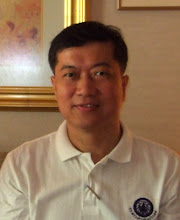Knowledge-Based Economy Still on the Menu
It seems DPM Kosit was careful to avoid the phrase Knowledge-Based Economy when he held forth on the future of the Thai economy. A bit puzzling, as this phrase is a commonly used one, but less so when you think about it.
Former PM Thaksin was fond of spouting this and other management buzzwords and phrases during his term at the helm of the Thai government. Not that he did anything about it. The budget on education was more likely to be spent on snazzy-looking physical infrastructure (OKMD, anyone?). The improvement of teacher quality and incentives to make teaching an attractive profession, meanwhile, got short shrift. As a result, despite the pretty rhetoric on KBE, Thai education remains in a woeful condition, notwithstanding the quantitative progress in pre-primary education dutifully noted by UNESCO.
Thaksin may have failed in improving Thailand's education, but his rhetoric still resonates, as well it should, since every globalization-aware country is putting education at the top of its agenda. But the Surayud regime seems reluctant to give the impression that at least some aspects of that fuzzy approach to development dubbed Thaksinomics are valid. So you have the spectacle of one of Thailand's most respected economists, who's now one of the Surayud government's most senior people, beating around the bush about the need to build a knowledge-based economy, but not in so many words.
Actually, the Surayud government doesn't need to repudiate the Thaksin legacy wholesale in order to legitimize the coup. All it needs to do is produce evidence of criminal wrongdoing (and obstruction of justice?) involving Thaksin and his cronies. That would be the surest way to ensure that Thaksin can no longer become a dominant force in Thai politics.
And if you must go through all those contortions to avoid saying the KBE word, we will forgive you, as long as you walk the walk, not just talk the talk, on how the country must work smarter.
Kosit: Country must work smarter to expand economy
DARANA CHUDASRI
Bangkok Post, 29 October 2006
Thailand needs to raise national productivity through increased use of intellectual property and skills, rather than pursue growth simply through labour and capital, according to Kosit Panpiemras, a deputy prime minister and industry minister.
Mr Kosit, an economist by training, said Thailand's economic growth was almost entirely driven by labour and capital factors, in contrast to countries like Korea or Japan. where intellectual property (IP) and innovation help drive growth.
"IP is what we need to focus on if we want to raise ourselves to become a developed country. The alternative is to face increasing problems in the long run," he said yesterday.
A new national plan aimed at developing basic intellectual factors is now being prepared by the National Economic and Social Development Board. It is intended as a roadmap to raise productivity through knowledge and skill improvements.
Mr Kosit said labour was increasingly a constraint on growth, and that competitiveness rankings for Thailand had shown declines in recent years.
"One year [of the interim government] may not be enough to establish a basic plan on developing intellectual factors. But it is better than doing nothing," he said. "We need the co-operation and support from the public to keep the concept moving forward in the future. If we cannot increase our productivity, our country cannot grow."
skip to main |
skip to sidebar

ถ้าคุณเคยอ่านคอลัมน์ "ฟอไฟฟุดฟิดอังกฤษอเมริกัน" ในหนังสือพิมพ์เดลินิวส์แล้วยังไม่เข็ด ก็เชิญอ่านบลอกนี้ได้ครับ แต่อย่าหาว่าเราไม่เตือนแล้วกัน
Followers
Kindle 2 is here, at last!
สำหรับแฟนฟอไฟฟุดฟิดอังกฤษอเมริกัน
My Other Stuff on the Web = อย่างอื่นของผมในเว็บ
Blog Archive = บลอกตอนเก่าๆ
About Me = เกี่ยวกับตัวผม

- Bob Boonhod
- I began writing my column in 1989. The column became the basis for 6 books and one audio CD. ผมเริ่มเขียนคอลัมน์นี้เมื่อปี 2532 และได้รวมเล่มเป็นหนังสือ 6 เล่ม และซีดี 1 ชุด For details, see: ดูรายละเอียดได้ที่ http://boonhod.50megs.com/MyBooks.html
My Cool Friends
Cool Links
- Bangkok Pundit
- OEDB Writing Resources: ตำราสารพัดสำหรับนักเขียน
- Dumb Little Man: พัฒนาตัวเองได้ที่นี่
- Truemors ข่าวสดๆ น่าสนใจ
- Electronic Frontier Foundation มูลนิธิเพื่ออินเตอร์เน็ตเสรี
- FACT: เพื่อเสรีภาพทางความคิดของคนไทย
- An Inconvenient Truth: ภัยโลกร้อน
- Brad DeLong อาจารย์เศรษฐศาสตร์ที่ UC Berkeley
- Dani Rodrik's blog
- วารสาร Harvard International Review
- นิตยสาร Wired
- นิตยสาร Technology Review
- Thai E-News
- นิตยสาร Open Online
- นิตยสารสยามปริทัศน์
- สำนักพิมพ์ฟ้าเดียวกัน
- Illustrator World: ศูนย์รวมเซียน Illustrator
- Worth 1000: ศูนย์รวมเซียน Photoshop
- มหาวิทยาลัยที่สอนให้ผมรักประชาชน
- UCLA มหาวิทยาลัยที่ผมเรียน
- USC มหาวิทยาลัยที่ผมเรียน
- American Mensa สมาคมที่ผมเคยเป็นสมาชิก

No comments:
Post a Comment